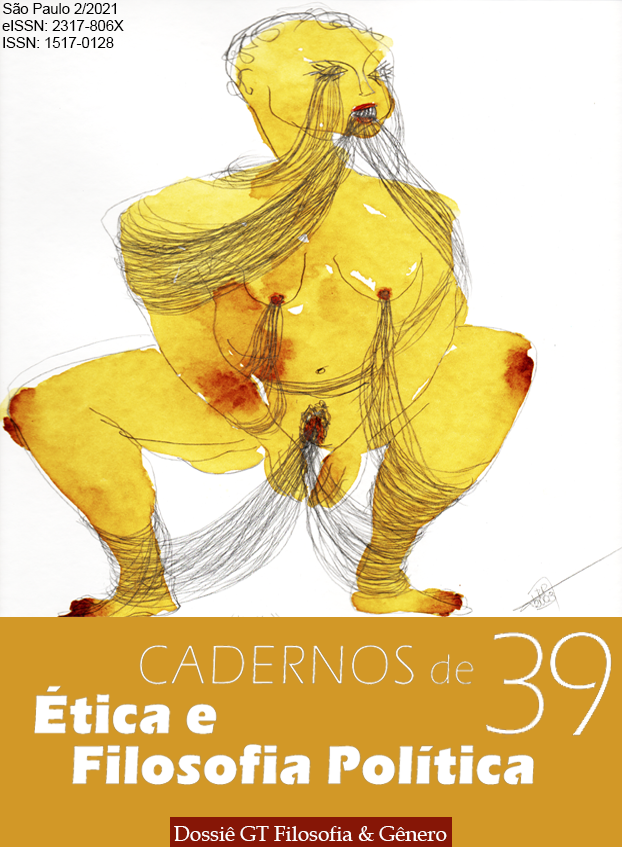On the importance of gender transversality for the Contemporary Ffeminist debate
DOI:
https://doi.org/10.11606/issn.1517-0128.v39i2p333-343Keywords:
Gender, Transversality, Public polities, Woman's right, FeminismsAbstract
The first treaty about the necessity of developing international cooperation to the defense of the human rights, independently of race, gender, language or religion, was the Charter of the United Nations, in 1945. In time, other documents, like the Inter-American Convention on Granting of Civil Rights to Woman (1948), Convention on the Political Rights of Woman (1953), Convention on the Elimination of All Forms of Discrimination against Women (1979) have been ratified. In Brazil, the gender inequality started to be debated with the redemocratization process in the 1980s. However, the international politics agenda persists on defending overcoming inequality under the individual bias, ignoring its interface with other issues, such as: poverty and race, for example. Other important aspects of the debate, such as the denaturalisations and the identity dimension of the body and the feminists ethics of the denial of the duty of care, are also ignored. Observing women beyond the limits imposed by sexual and social division of work can be an alternative to the process of enforcement of human rights assured to this group by law, but repeatedly denied by culture.
Downloads
References
BANDEIRA, L. M.; ALMEIDA, T. M. C. de. “A transversalidade de gênero nas políticas públicas”, In: Revista do CEAM, v. 2, n. 1, pp. 35-46, 2013.
BRASIL. Constituição (1988). Disponível em: http://www.planalto.gov.br/ccivil_03/constituicao/constituicao.htm. Acesso em: 26 mar.2017.
BRASIL. Decreto 1.9841, de 22 de outubro de 1945. Promulga a carta das Nações Unidas, da qual faz parte integrante o anexo Estatuto da Corte Internacional de Justiça, assinada em São Francisco, a 26 de junho de 1945, por ocasião da Conferência de Organização Internacional das Nações Unidas. Diário Oficial [da] República Federativa do Brasil. Brasília, DF, 22 outubro 1945. Disponível em: http://www.planalto.gov.br/ccivil_03/decreto/1930- 1949/d19841.htm. Acesso em: 9 jun.2017.
BRASIL. Decreto n 65.810, de 8 de dezembro de 1969. Promulga a Convenção Internacional sobre a eliminação de todas as formas de discriminação racial. Diário Oficial [da] República Federativa do Brasil. Brasília, 8 de dezembro de 1969. Disponível em: http://legis.senado.gov.br/legislacao/ListaTextoIntegral.action?id=9483. Acesso em: 2 jun.2017.
BRASIL. Gênero e pobreza no Brasil: relatório final do projeto Governabilidad Democratica de Género en America Latina y el Caribe. CEPAL, SPM: Brasília, 2005.
BRASIL. Violência LGBTFóbicas no Brasil: dados da violência/ elaboração de Marcos Vinícius Moura Silva – Documento eletrônico – Brasília: Ministério dos Direitos Humanos, 2018. Disponível em: https://www.mdh.gov.br/biblioteca/consultorias/lgbt/violencia- lgbtfobicas-no-brasil-dados-da-violencia. Acesso: 07 fev.2020.
DAVIS, A. Mulheres, raça e classe. Tradução Heci Regina Candiani. São Paulo: Boitempo.
FLAUBERT, G. Madame Bovary: costumes de província. Tradução Fúlvia M. L. Moretto. São Paulo: Nova Alexandria, 2007.
Mapa da violência de Gênero: mulheres são quase 67% das vítimas de agressão física no Brasil. Documento eletrônico. 11 jul.2019. Disponível em: http://www.generonumero.media/mapa-da-violencia-de-genero-mulheres-67-agressao- fisica/. Acesso: 12 fev.2020.
MIGUEL, L. F.; BIROLI, F. Feminismo e política: uma introdução. São Paulo: Boitempo, 2014.
MILL, J. S. A sujeição das mulheres. Tradução Paulo Geiger. São Paulo: Companhia das Letras, 2017.
MILL, J. S. Considerações sobre o governo representativo. Tradução Denise Bottman. Porto Alegre, RS: L&PM, 2018.
REALE, Miguel. Lições preliminares de Direito. São Paulo: Saraiva, 2002.
REALE, Miguel Filosofia do Direito. São Paulo: Saraiva, 2002.
ROCHA, Carmem Lúcia Antunes. “Ação afirmativa: o conteúdo democrático do princípio da igualdade jurídica”. In: Revista de Informação Legislativa. V. 33, n. 131, pp. 283-295, 1996. Disponível em: http://www2.senado.leg.br/bdsf/handle/id/176462. Acesso em: 2 jun.2017.
ROCHA, Carmem Lúcia Antunes. “O princípio da dignidade da pessoa humana e a exclusão social”. In: Revista Interesse Público, n. 4, pp. 23-49, 1999. Disponível em: http://egov.ufsc.br/portal/sites/default/files/anexos/32229-38415-1-PB.pdf. Acesso em: 1 jun.2017.
ROCHA, Carmem Lúcia Antunes. “Ação Afirmativa: O conteúdo democrático do princípio da igualdade jurídica”. In: Revista de informação legislativa. v. 33., n. 131, pp. 283-295, 1996. Disponível em: http://www2.senado.leg.br/bdsf/item/id/176462. Acesso em 30 jun. 2016.
WAISELFISZ, J. J. Mapa da violência 2015: Homicídio de mulheres no Brasil. Documento eletrônico. Brasília: Ministério das Mulheres, da Igualdade Racial e dos Direitos Humanos, 2015. Disponível em: https://www.mapadaviolencia.org.br/pdf2015/MapaViolencia_2015_mulheres.pdf. Acesso: 07 fev.2020.
WOOLF, V. As mulheres devem chorar... Ou se unir contra a guerra: patriarcado e militarismo. Tradução Tomaz Tadeu. Belo Horizonte: Autêntica, 2019.
Downloads
Published
Issue
Section
License
Copyright (c) 2021 Veronica Calado

This work is licensed under a Creative Commons Attribution-ShareAlike 4.0 International License.


